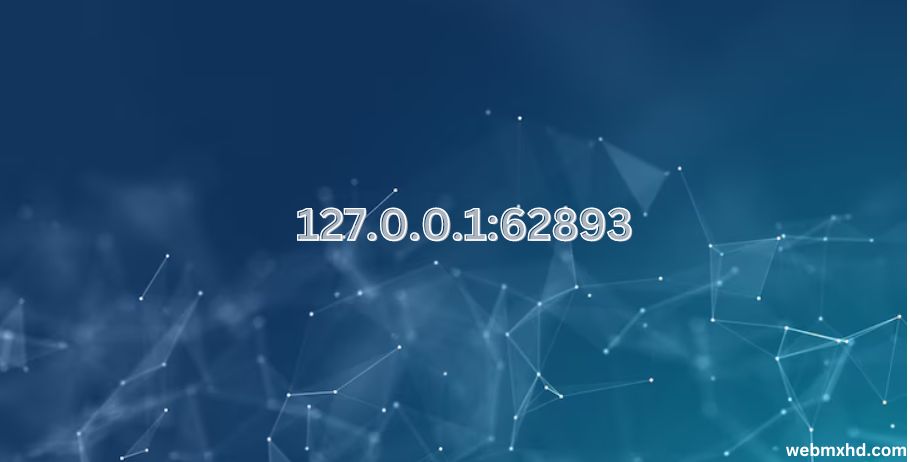
In the realm of networking and web development, the terms 127.0.0.1 and port numbers often arise, yet they might be confusing for those unfamiliar with these concepts. Among these, the combination 127.0.0.1:62893 is a specific instance of how IP addresses and ports interact to facilitate communication within a computer system. This article aims to demystify these terms, offering a clear understanding of their importance and practical applications.
The Concept of 127.0.0.1
The IP address 127.0.0.1 is universally known as the loopback address. It’s commonly referred to as localhost and is used to test network software by directing traffic back to the same machine that initiated the request. This loopback mechanism is invaluable for developers, enabling them to simulate network connections without involving external networks.
What Are Port Numbers?
Port numbers are essential components of networking. They serve as gateways that direct traffic to the appropriate service running on a computer. Each service, whether it’s a web server, an email client, or a database, listens on a specific port. The combination of an IP address with a port number, such as 127.0.0.1:62893, helps route data to the correct application.
The Significance of 127.0.0.1:62893
When you see 127.0.0.1:62893, it represents a request being sent to the localhost (127.0.0.1) on port 62893. This combination is often used in development environments where different services are tested locally. The number 62893 is a specific port that a particular service might use. It’s a part of the communication pathway that allows your computer to know where to send and receive data.
Using 127.0.0.1:62893 in Development
In practical terms, accessing 127.0.0.1:62893 involves typing this address into a web browser or using a command-line tool to interact with the service listening on that port. Developers commonly use this setup to test applications like web servers or APIs in a safe, local environment before deploying them to live servers.
Security Considerations
Although localhost is generally secure, it’s crucial to ensure that any services running on 127.0.0.1:62893 are configured correctly to prevent unauthorized access. Even though the traffic does not leave your computer, vulnerabilities in the service itself could potentially expose sensitive information or allow malicious actors to exploit the service.
Troubleshooting Issues with 127.0.0.1:62893
If you encounter issues when trying to connect to 127.0.0.1:62893, the first step is to ensure that the service is running and correctly configured. Tools like netstat can help identify whether the port is open and if there are any conflicts. Restarting the service or checking firewall settings might also resolve connectivity problems.
Real-World Applications
The use of 127.0.0.1:62893 extends beyond simple testing. In web development, for instance, developers often run a local server that listens on a specific port to test how a website or application will behave in a real-world scenario. This allows for thorough testing and debugging before the site goes live. Additionally, services like databases or custom applications often listen on high-numbered ports like 62893 for local development purposes.
The Future of Localhost and Ports
As technology evolves, the role of localhost and specific port numbers like 62893 will continue to be significant in development and testing. Emerging technologies that rely on microservices, containerization, and virtual environments still depend heavily on localhost configurations. Understanding how to work with addresses like 127.0.0.1:62893 will remain a fundamental skill for developers.
FAQs about 127.0.0.1:62893
What is the significance of 127.0.0.1?
127.0.0.1 is the loopback IP address, commonly referred to as localhost, used for testing and development purposes.
Why is 127.0.0.1 often paired with a port number?
Pairing 127.0.0.1 with a port number directs traffic to a specific service or application running on the local machine.
How do I troubleshoot issues with 127.0.0.1:62893?
Ensure the service is running, check for port conflicts, and verify firewall settings to troubleshoot connectivity issues.
What are the security concerns with using 127.0.0.1?
While localhost is secure by nature, misconfigured services can still expose vulnerabilities. It’s important to secure any services running on localhost.
Can 127.0.0.1 be used in production environments?
Typically, 127.0.0.1 is used for development and testing, not in production. Production environments generally use external IP addresses.
Conclusion
The combination 127.0.0.1:62893 may seem like just another technical detail, but it’s a crucial part of how computers communicate internally. Whether you’re developing web applications, testing network services, or simply trying to understand how your computer processes requests, knowing how IP addresses and port numbers work together can greatly enhance your understanding of networking. By mastering these concepts, you’ll be better equipped to troubleshoot, secure, and optimize your local development environment.
If you gained new insights from this article, explore our blog, Gimkit, for more enlightening content.